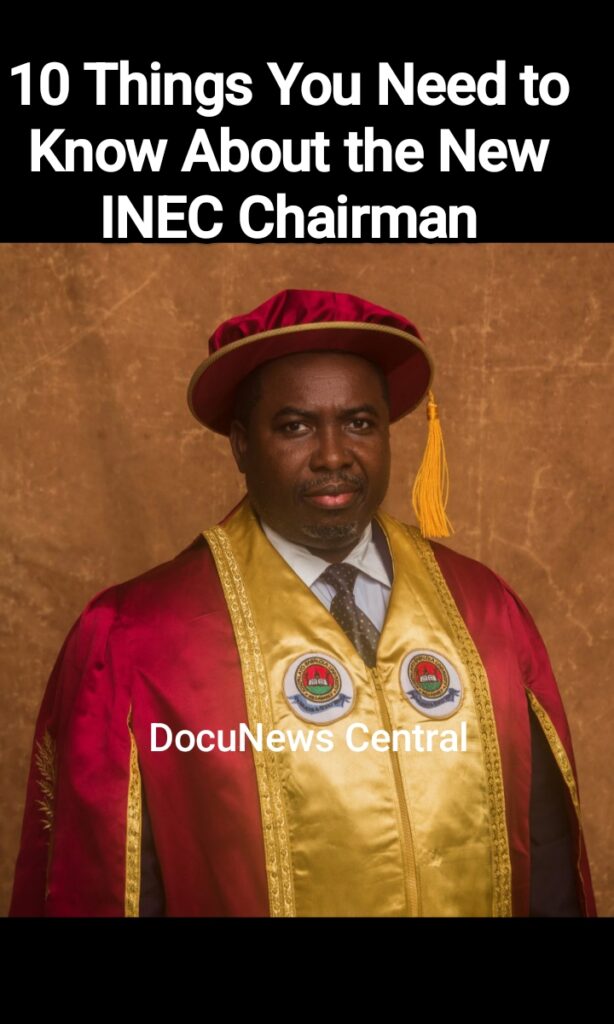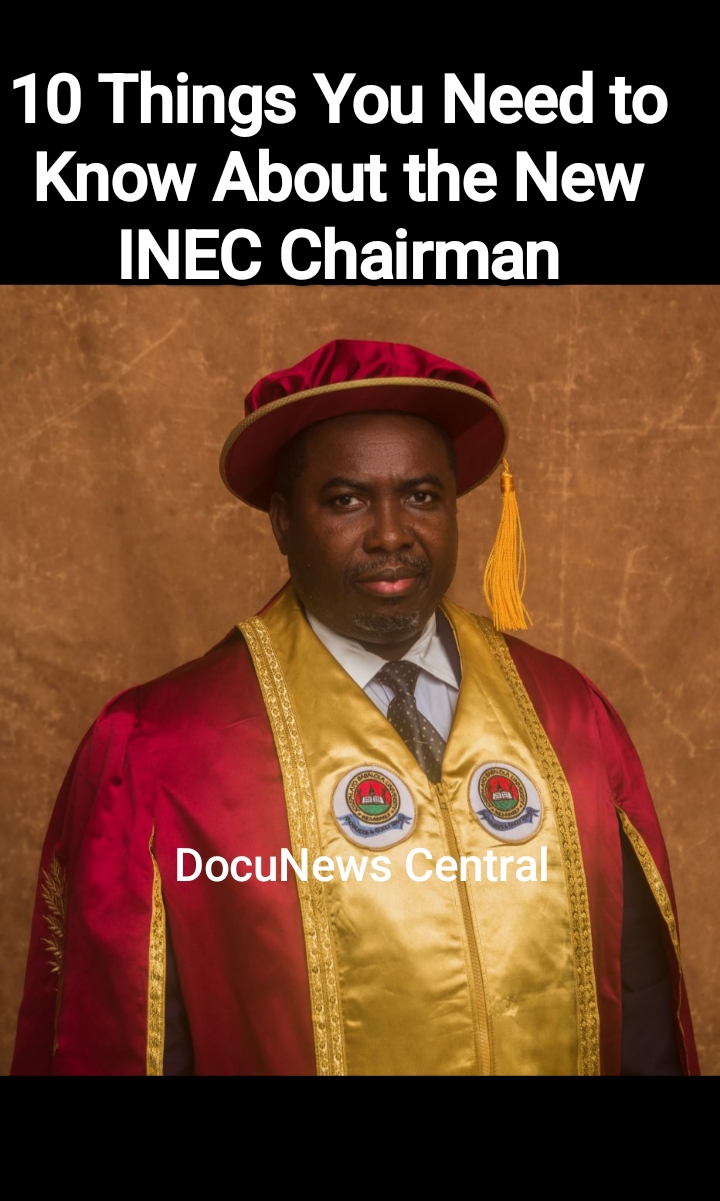
10 Things You Need to Know About the New INEC Chairman
Copyright reserved, DocuNews Central
Nigeria’s electoral body, the Independent National Electoral Commission (INEC), stands at a pivotal moment following the appointment of a new chairman. His selection comes amid rising public demand for credible, transparent elections. Below, DocuNews Central presents 10 essential facts about the new INEC Chairman — a guide for citizens, observers, and all stakeholders who care deeply about the future of democracy in Nigeria.
1. Who is the New INEC Chairman?
On October 9, 2025, President Bola Ahmed Tinubu nominated Professor Joash Ojo Amupitan, SAN as the new Chairman of INEC (Premium Times).
His nomination received unanimous approval by the National Council of State (TVC News). The next constitutional step is Senate screening and confirmation. He succeeds Professor Mahmood Yakubu, whose ten-year tenure ended in October 2025.
2. His Background and Origins
Born on April 25, 1967, Amupitan hails from Ayetoro Gbede in Ijumu Local Government Area of Kogi State, Nigeria. He attended Kwara State Polytechnic between 1982 and 1984, where he earned a National Diploma. He later graduated with an LL.B (Hons) from the University of Jos in 1987 and was called to the Nigerian Bar in 1988. He went on to obtain an LL.M (1993) and a Ph.D. in Law (2007) from the same university (Vanguard). read also Mother Mourns Daughter Who Died After Severe Scorpion Sting
He is married and blessed with four children. His academic and personal background positions him as a respected figure with deep national and regional ties.
3. Academic Excellence and Legal Credentials
Amupitan boasts over 35 years of academic and legal experience (Channels TV). He rose through the ranks to become a full Professor of Law in 2008. In 2014, he earned the prestigious title of Senior Advocate of Nigeria (SAN) — a recognition for outstanding legal scholarship and advocacy.
His specializations include Company Law, Corporate Governance, Law of Evidence, and Privatisation Law. These areas give him the expertise to handle complex institutional and procedural reforms vital to INEC’s operations.
4. University Leadership and Governance Roles
Before his INEC nomination, Amupitan served as Deputy Vice-Chancellor (Administration) at the University of Jos. He previously held positions such as Dean of the Faculty of Law and Chairman of the Committee of Deans and Directors.
Beyond academia, he is Pro-Chancellor and Chairman of the Governing Council of Joseph Ayo Babalola University (JABU) in Osun State. His other roles include serving on boards like the Council of Legal Education and the Nigerian Institute of Advanced Legal Studies (NIALS). His broad leadership record reflects his deep administrative competence and reform mindset.
5. Firsts and Unique Highlights
- He is the first person from Kogi State to lead INEC.
- His appointment strengthens North-Central representation in national institutions.
- He replaced Mahmood Yakubu, who served as INEC Chairman from 2015 to 2025.
- May Agbamuche-Mbu briefly served as Acting Chair before his appointment (Wikipedia).
6. Key Challenges Ahead
As he takes charge, Amupitan faces numerous institutional and technical hurdles that will test his integrity and skill.
1. Rebuilding Public Trust
The 2023 elections generated doubts about INEC’s transparency. Many Nigerians lost faith in the system after technical breakdowns and perceived bias (The Guardian). He must restore confidence through openness and credible results.
2. Technological Reliability
The Bimodal Voter Accreditation System (BVAS) and INEC Result Viewing Portal (IReV) failed during critical moments in 2023. These systems need better testing, upgrades, and maintenance to ensure reliability in future polls.
3. Logistics and Planning
Nigeria’s size and infrastructure present logistic challenges. He must improve material distribution, staff training, and inter-agency coordination for smoother elections.
4. Legal and Institutional Reform
Strengthening electoral laws and administrative safeguards will help prevent manipulation. He is expected to champion reforms that simplify dispute resolution and enhance voter protection.
5. Political Pressure and Independence
Public observers stress the need for institutional independence. Amupitan must resist executive or partisan influence while upholding constitutional principles.
7. What Stakeholders Expect
Expectations from Nigerians and political actors are sky-high:
- Civil society groups urge him to protect public interest above political loyalty.
- The Coalition of United Political Parties (CUPP) wants fearless, transparent leadership.
- Peter Obi has called on INEC under Amupitan to verify the credentials of all 2027 candidates.
- The APC has pledged cooperation while emphasizing adherence to the rule of law.
These expectations highlight the national importance of his role in shaping the credibility of future elections.
8. Immediate Tasks on His Agenda
Upon Senate confirmation, Professor Amupitan’s first major tasks will include:
- Conducting the 2025 Anambra State Governorship Election scheduled for November 8, 2025.
- Overseeing the 2026 FCT Area Council Elections.
- Launching a BVAS and IReV audit to prevent technical glitches.
- Engaging stakeholders to strengthen cooperation among political parties, security agencies, and civil society.
9. What Success Could Look Like
If Amupitan performs well, his tenure could deliver measurable gains:
- Renewed voter confidence and reduced apathy.
- Seamless elections with fewer technological issues.
- Stronger legal and administrative reforms.
- Lower litigation rates after elections.
- A transparent and respected INEC institution.
However, failure to meet these expectations might erode public trust even further.
10. Why His Appointment Matters
INEC’s leadership affects every citizen. The chairman’s integrity and competence directly determine whether democracy thrives or weakens. A credible election process builds national stability, fosters participation, and enhances Nigeria’s global image.
Therefore, Professor Amupitan’s era must focus on accountability, transparency, and technological innovation. His actions will shape the direction of Nigeria’s democracy for years to come.
Final Thoughts
Professor Joash Ojo Amupitan’s appointment as INEC Chairman represents both a new dawn and a serious challenge. His credentials inspire confidence, but his success will depend on tangible reforms and transparent leadership. Nigerians, civil society, and the media must hold him accountable while offering constructive support.
DocuNews Central will continue to monitor his activities, from Senate confirmation to election preparations, and provide factual updates on how he performs in office.
Copyright reserved, DocuNews Central









Your point of view caught my eye and was very interesting. Thanks. I have a question for you. https://www.binance.com/ru/register?ref=O9XES6KU